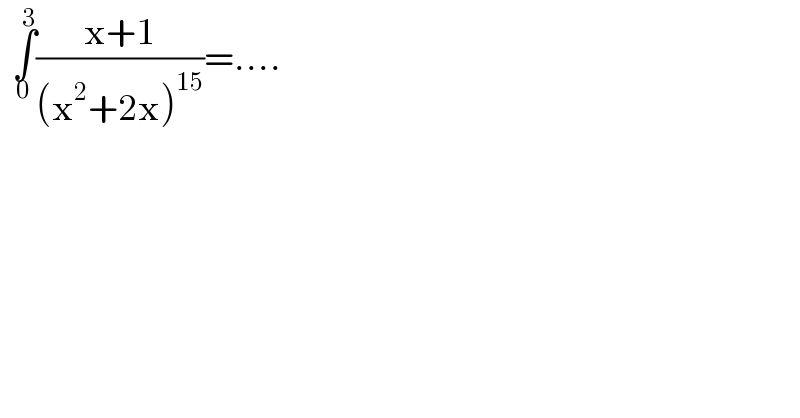Question Number 81657 by zainal tanjung last updated on 14/Feb/20

$$\:\:\underset{\mathrm{0}} {\overset{\mathrm{3}} {\int}}\frac{\mathrm{x}+\mathrm{1}}{\left(\mathrm{x}^{\mathrm{2}} +\mathrm{2x}\right)^{\mathrm{15}} }=…. \\ $$
Commented by Tony Lin last updated on 14/Feb/20
![∫ ((x+1)/((x^2 +2x)^(15) ))dx ⇒let u=x^2 +2x, then (du/dx)=2(x+1) ∫(1/(2u^(15) ))du =−(1/(28u^(14) ))+c =−(1/(28(x^2 +2x)))+c ∫_0 ^3 ((x+1)/((x^2 +2x)^(15) ))dx =[−(1/(28(x^2 +2x)))]_0 ^3 ⇒divergent](https://www.tinkutara.com/question/Q81678.png)
$$\int\:\frac{{x}+\mathrm{1}}{\left({x}^{\mathrm{2}} +\mathrm{2}{x}\right)^{\mathrm{15}} }{dx} \\ $$$$\Rightarrow{let}\:{u}={x}^{\mathrm{2}} +\mathrm{2}{x},\:{then}\:\frac{{du}}{{dx}}=\mathrm{2}\left({x}+\mathrm{1}\right) \\ $$$$\int\frac{\mathrm{1}}{\mathrm{2}{u}^{\mathrm{15}} }{du} \\ $$$$=−\frac{\mathrm{1}}{\mathrm{28}{u}^{\mathrm{14}} }+{c} \\ $$$$=−\frac{\mathrm{1}}{\mathrm{28}\left({x}^{\mathrm{2}} +\mathrm{2}{x}\right)}+{c} \\ $$$$\int_{\mathrm{0}} ^{\mathrm{3}} \:\frac{{x}+\mathrm{1}}{\left({x}^{\mathrm{2}} +\mathrm{2}{x}\right)^{\mathrm{15}} }{dx} \\ $$$$=\left[−\frac{\mathrm{1}}{\mathrm{28}\left({x}^{\mathrm{2}} +\mathrm{2}{x}\right)}\right]_{\mathrm{0}} ^{\mathrm{3}} \\ $$$$\Rightarrow{divergent} \\ $$
Commented by zainal tanjung last updated on 14/Feb/20

$$\mathrm{Thanks}\:\mathrm{Sir}! \\ $$
